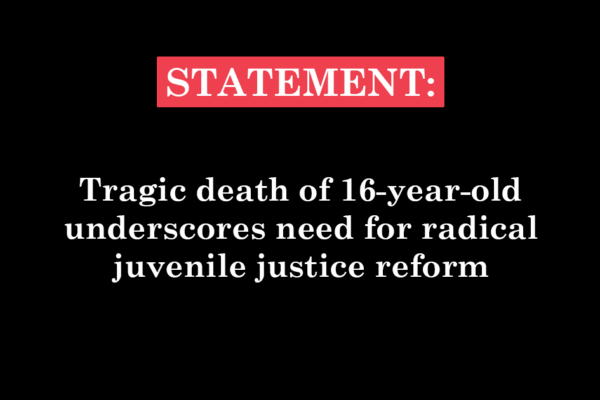SOUTH CAROLINA – Today, the Department of Juvenile Justice (DJJ) announced the death of a 16-year-old boy who died in custody.
In response, Jace Woodrum, executive director of the ACLU of South Carolina, released the following statement:
The ACLU of South Carolina and its partners mourn the tragic and inexcusable death of a child in DJJ custody. We encourage those who mourn with us to let grief spur action and to join us in demanding that the State take immediate steps to ensure that South Carolina children are held in safe, therapeutic facilities. This death is devastating. But tragedies such as this one are not surprising — they are the inevitable consequence of years of systemic failures by the State of South Carolina. Providing meaningful rehabilitation of children in the care of the state is impossible without radical reform. The plain truth is that we egregiously over-incarcerate children, many times for non-criminal offenses like truancy or running away. As a result, our juvenile detention facilities — required by state law to be “rehabilitative” — are anything but. These facilities are overcrowded and understaffed. Lack of supervision, lack of mental healthcare, and myriad other failures conspire to create violent, torturous conditions that mentally, emotionally, and physically traumatize some of the most vulnerable members of our society. Such conditions spark tragedy. There will assuredly be others. We call on the Department of Juvenile Justice, the General Assembly, and the Courts to take immediate action. We cannot risk more of our children’s lives.
The ACLU of South Carolina is calling on the Department of Juvenile Justice, the General Assembly, and the Courts to implement solutions that will reduce the number of children behind bars now:
- Stop arresting and incarcerating children for being children. Arrests and incarceration for offenses such as truancy, running away, or underage drinking are causing overcrowding in our juvenile facilities. These children need intervention—not arrest and incarceration.
- Release nonviolent children who are currently incarcerated. Our juvenile facilities are understaffed, creating environments with a lack of supervision as nonviolent children share space with children accused of or convicted of violent offenses. Nonviolent children should be released from custody and provided with mental healthcare, addiction recovery, and other support services.
The ACLU of South Carolina has brought ongoing legal action in SC NAACP v. SC Department of Juvenile Justice. The lawsuit details the unsafe conditions at DJJ facilities. Toilets are frequently stopped up for weeks on end, leaving human waste in the open where children sleep. Showers and cells are infested with mold, and children go hungry rather than eat food that is rancid, contaminated, or contains cockroaches. Facility staff have used pepper spray and tasers on children, and some are kept in solitary confinement for days on end.
The lawsuit, originally filed in April 2022, demands that the State provide the basics for children in its care: “clean water, dry beds, healthy food, safety from violence, freedom from solitary confinement, meaningful access to education and mental health resources, and accommodations for children with disabilities.” The plaintiffs in the lawsuit are the South Carolina NAACP, Justice 360, and Disability Rights South Carolina. Our legal partners in the case are the NAACP, Wyche, and Jenner & Block.
Stay Informed
Sign up to be the first to hear about how to take action.
By completing this form, I agree to receive occasional emails per the terms of the ACLU’s privacy statement.
By completing this form, I agree to receive occasional emails per the terms of the ACLU’s privacy statement.


